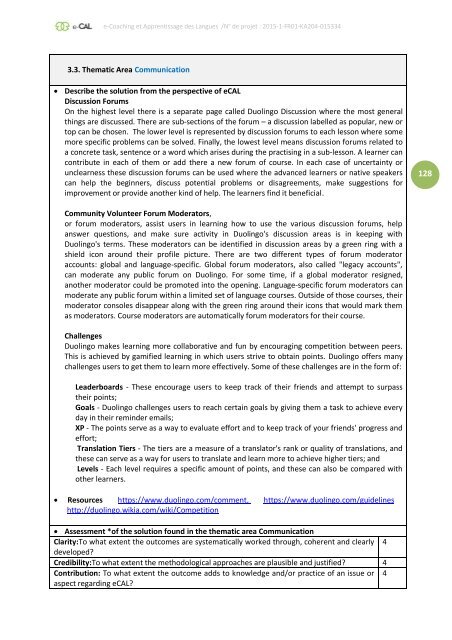e-CAL - e-Coaching et Apprentissage des Langues
The ERASMUS+ project e-CAL presents the result of an analysis of support methods in the case of language learning using web-based Open Educational Resources (OER).
The ERASMUS+ project e-CAL presents the result of an analysis of support methods in the case of language learning using web-based Open Educational Resources (OER).
You also want an ePaper? Increase the reach of your titles
YUMPU automatically turns print PDFs into web optimized ePapers that Google loves.
e-<strong>Coaching</strong> <strong>et</strong> <strong>Apprentissage</strong> <strong>des</strong> <strong>Langues</strong> /N° de proj<strong>et</strong> : 2015-1-FR01-KA204-015334<br />
3.3. Thematic Area Communication<br />
Describe the solution from the perspective of e<strong>CAL</strong><br />
Discussion Forums<br />
On the highest level there is a separate page called Duolingo Discussion where the most general<br />
things are discussed. There are sub-sections of the forum – a discussion labelled as popular, new or<br />
top can be chosen. The lower level is represented by discussion forums to each lesson where some<br />
more specific problems can be solved. Finally, the lowest level means discussion forums related to<br />
a concr<strong>et</strong>e task, sentence or a word which arises during the practising in a sub-lesson. A learner can<br />
contribute in each of them or add there a new forum of course. In each case of uncertainty or<br />
unclearness these discussion forums can be used where the advanced learners or native speakers<br />
can help the beginners, discuss potential problems or disagreements, make suggestions for<br />
improvement or provide another kind of help. The learners find it beneficial.<br />
128<br />
Community Volunteer Forum Moderators,<br />
or forum moderators, assist users in learning how to use the various discussion forums, help<br />
answer questions, and make sure activity in Duolingo's discussion areas is in keeping with<br />
Duolingo's terms. These moderators can be identified in discussion areas by a green ring with a<br />
shield icon around their profile picture. There are two different types of forum moderator<br />
accounts: global and language-specific. Global forum moderators, also called "legacy accounts",<br />
can moderate any public forum on Duolingo. For some time, if a global moderator resigned,<br />
another moderator could be promoted into the opening. Language-specific forum moderators can<br />
moderate any public forum within a limited s<strong>et</strong> of language courses. Outside of those courses, their<br />
moderator consoles disappear along with the green ring around their icons that would mark them<br />
as moderators. Course moderators are automatically forum moderators for their course.<br />
Challenges<br />
Duolingo makes learning more collaborative and fun by encouraging comp<strong>et</strong>ition b<strong>et</strong>ween peers.<br />
This is achieved by gamified learning in which users strive to obtain points. Duolingo offers many<br />
challenges users to g<strong>et</strong> them to learn more effectively. Some of these challenges are in the form of:<br />
Leaderboards - These encourage users to keep track of their friends and attempt to surpass<br />
their points;<br />
Goals - Duolingo challenges users to reach certain goals by giving them a task to achieve every<br />
day in their reminder emails;<br />
XP - The points serve as a way to evaluate effort and to keep track of your friends' progress and<br />
effort;<br />
Translation Tiers - The tiers are a measure of a translator's rank or quality of translations, and<br />
these can serve as a way for users to translate and learn more to achieve higher tiers; and<br />
Levels - Each level requires a specific amount of points, and these can also be compared with<br />
other learners.<br />
Resources https://www.duolingo.com/comment, https://www.duolingo.com/guidelines<br />
http://duolingo.wikia.com/wiki/Comp<strong>et</strong>ition<br />
Assessment *of the solution found in the thematic area Communication<br />
Clarity:To what extent the outcomes are systematically worked through, coherent and clearly 4<br />
developed?<br />
Credibility:To what extent the m<strong>et</strong>hodological approaches are plausible and justified? 4<br />
Contribution: To what extent the outcome adds to knowledge and/or practice of an issue or 4<br />
aspect regarding e<strong>CAL</strong>?


